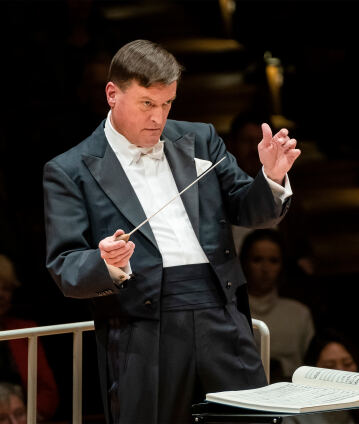A Strauss evening with Christian Thielemann and Anja Kampe

Christian Thielemann, an outstanding interpreter of Strauss, dedicates an entire concert to the composer – with two discoveries and a crowd pleaser. The evening opens with the extremely charming Sonatina for 16 Winds No. 1, followed by the equally sonorous and expressive Three Hymns, op. 71 (soloist: Anja Kampe). The finale of the concert is an instrumental suite from Strauss’s bittersweet opera Der Rosenkavalier: dramatic, melancholic, humorous but always overwhelmingly beautiful.
Richard Strauss, Christian Thielemann says, “was always an untroubled person, even though he composed very troubled content. Unlike Wagner, who constantly lived drama with his affairs with women, political radicalism and debts, the scandal remained on the stage with Strauss. He returned time and again to his idyll in Garmisch, cultivating that pleasant Bavarian regional patriotism. The difference is that Wagner was perpetually on existential duty and Strauss, after he had composed some dramatic music, could also just play cards for an afternoon.”
Of course, Christian Thielemann, who has penetrated deeply to the interpretative heart of Wagner’s musical work, also has a special relationship to Richard Strauss in his function as Principal Conductor of the Sächsische Staatskapelle Dresden: of the 16 operatic works that Strauss composed, nine premiered in Dresden. Thielemann, also Artistic Director of the Salzburg Easter Festival and Music Director of the Bayreuth Festival, is only too happy to fulfill the obligation that this results in: “In Dresden you always have the feeling that he could come in the door any moment.”
At his guest performance conducting the Berliner Philharmoniker too, Christian Thielemann will devote himself to Strauss’s works, whereby an unknown piece by Strauss will open the evening: the Sonatina for 16 wind instruments No. 1 in F major, with which in the first half of 1943 Strauss wanted to link up to his two successful early works for wind ensemble (the Suite op. 4 and the Serenade op. 7). The half-hour work, in which innumerable cantilenas and arabesque scherzando motifs follow each other amidst constant harmonic shimmering, scratches the surface of the symphonic despite its diminishing title; the hymnal presto conclusion also does its part.
After that, another Strauss discovery is on the programme: the Three Hymns op. 71 based on Friedrich Hölderlin, whose verses, which resist being smoothly set to music, posed a particularly stimulating challenge for Strauss. The soloist isAnja Kampe, who is at home at institutions such as the Bavarian State Opera, the Bayreuth festival hall, at La Scala in Milan and at the Vienna State Opera, and who was distinguished with Bavaria’s “Kammersängerin” in 2018. The evening will conclude with the atmospheric Rosenkavalier suite; since the opera was premiered in Dresden (on the occasion of which the railway administrations of Prussia and Saxony deployed special trains to cope with the tremendous demand), it has been one of Strauss’s most popular operas.
© 2019 Berlin Phil Media GmbH
Related interviews
Artists
Our recommendations
- Philippe Jordan conducts Strauss’s “Alpine Symphony”
- Wagner’s “Wesendonck Lieder” with Anja Kampe and Michael Boder
- Christian Thielemann conducts choral works by Johannes Brahms
- Christian Thielemann conducts Brahms’s “Deutsches Requiem”
- “The Golden Twenties”: Christian Thielemann conducts Hindemith, Strauss and Busoni
- Christian Thielemann conducts Beethoven’s “Eroica”